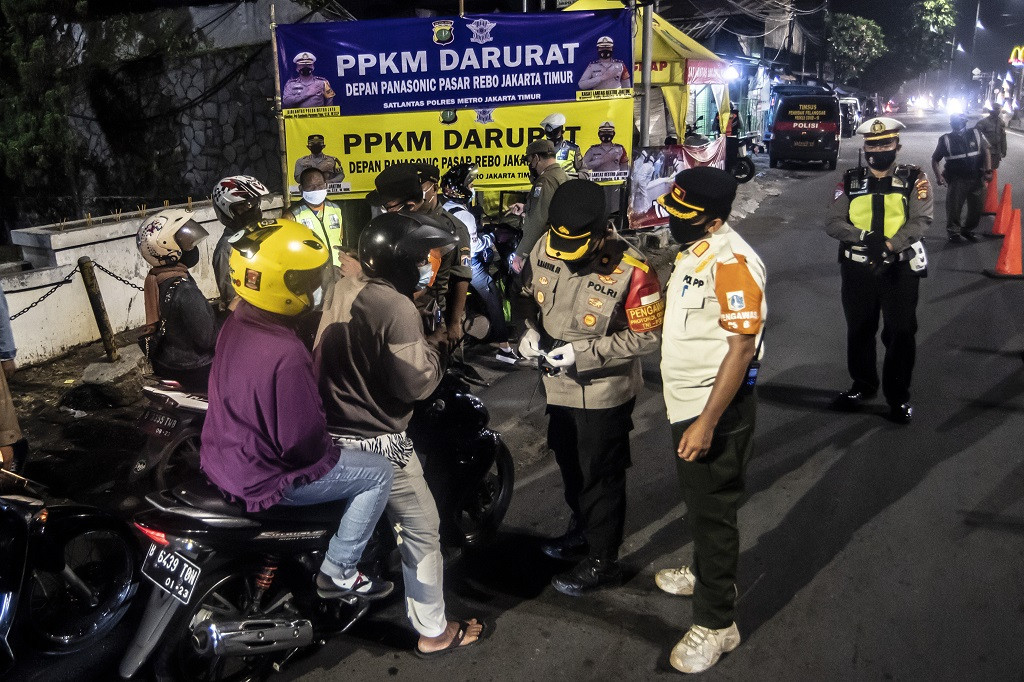Popular Reads
Top Results
Can't find what you're looking for?
View all search resultsPopular Reads
Top Results
Can't find what you're looking for?
View all search resultsGovernment seeks to simplify curbs regime with name change
Change text size
Gift Premium Articles
to Anyone
I
n announcing its decision to extend emergency curbs until the end of this week, the government has ditched its previous naming convention for a four-tier community activity restrictions (PPKM) system, officials have said.
Coordinating Maritime Affairs and Investment Minister Luhut Pandjaitan said the name change was made at the request of President Joko "Jokowi" Widodo in a bid to simplify the policy terms.
"Pak President has asked us not to use the terms PPKM Mikro or PPKM Darurat and use the simpler PPKM level IV instead. So in the future, we'll call the restrictions PPKM levels I, II, III and IV," Luhut said in a virtual press conference on Wednesday.
Under the new four-tier system, which was formalized in a Home Minister instruction issued on Tuesday, each city or regency must enforce restrictions based on their level of risk, with level IV being the most stringent.
The risk level is determined by each region’s transmission rate, health system response capacity as well as the “psychological condition of the people”, said Jodi Mahardi, spokesman for the Coordinating Maritime Affairs and Investment Minister, on Wednesday evening.
The first two indicators are based on guidelines issued by the World Health Organization in 2020.
Level IV classification is meant for regencies or cities with more than 150 confirmed cases per 100,000 people per week, a hospitalization rate of more than 30 patients per 100,000 people per week, and a mortality rate of more than five deaths per 100,000 people per week.
Regions scoring more than 15 percent on its testing positivity rate, more than 80 percent for its hospital bed occupancy rate (BOR) and tracing capacity of less than 5 people per COVID-19 case also qualify for level IV curbs.
Down the scale, level III restrictions are reserved for regions recording 50 to 150 cases, two to five deaths and a hospitalization rate of 10 to 30 patients per 100,000 people per week. Other indicators include a positivity rate between 5 and 15 percent, tracing capacity of 5 to 14 people per case and a BOR of 60 to 80 percent.
Levels I and II of the new PPKM regime are designated for cities or regencies with sufficient response capacity, which is indicated by a positivity rate of below 5 percent, tracing capacity of more than 14 people per case and a BOR of less than 60 percent. Those regions must also record less than 50 cases, 10 hospitalizations and two deaths per 100,000 people per week.
Under level IV restrictions, all schools and offices in nonessential sectors must be shuttered. All shops in malls and traditional markets that do not sell staple foods or daily essentials must also remain closed for the period of curbs.
Restaurants and food vendors are only allowed to serve takeout or delivery, while regional governments are asked to close all entertainment venues and public parks.
Restrictions are more lax in areas under PPKM levels I-III.
The four-tier system was initially featured in a government presentation to lawmakers earlier this month but was only unveiled on Tuesday evening by Luhut on a local television show.
On Wednesday, Luhut said most regencies and cities across Java and Bali fell under level III or IV restrictions, even though some regions had started demonstrating encouraging improvements since the emergency curbs were put in place on July 3.
Luhut also announced plans to gradually ease restrictions in several regions with lower risk levels starting on July 26.
We saw lower levels of public mobility after implementing the PPKM Darurat between July 3 and 20, which resulted in fewer daily cases and decreasing BOR. If the improvements persist, we will gradually lift and relax restrictions in several regions,” the senior minister said.
The naming convention has been the butt of many jokes on social media, with small businesses thinking up a variety of promotional content to fit the PPKM acronym.
Others have criticized the state for fueling confusion; it is the fifth term to be introduced by the government since the pandemic reached the country in March 2020.
The government’s use of odd nomenclature is by some accounts a way to get around the limitations of existing laws and regulations. Law No. 6/2018 on health quarantines, for instance, only stipulates the imposition of house/hospital/regional quarantines as well as large-scale social restrictions (PSBB). The current regime of emergency public activity restrictions (PPKM Darurat) and other earlier iterations are enacted by the Home Ministry and not the Health Ministry, as was the case last year.










